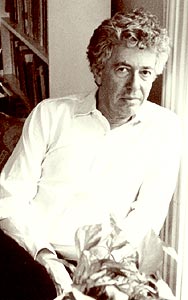 |
| Alex Katz, "Frank O'Hara," cutout: oil on wood (double-sided), 1959, Robert Miller Gallery (via Artsy.net) |
But whereas Ashbery had a long and varied career that stretched for over half a century, O'Hara's ended after a roughly two decade stretch; in barely 20 years (1948-1966), beginning during his undergraduate career at Harvard and continuing through his time at the University of Michigan and his years in New York City working as a museum curator, he published nearly all the poetry that made his name. He also served as an artistic, social and cultural avatar, linking poets ranging from Amiri Baraka (LeRoi Jones) to James Merrill to Allen Ginsberg to Gregory Corso to Diane DiPrima, though O'Hara's closest connections were with the poets and Abstract Expressionist and pre-Pop visual artists clustered around what Donald Allen named the New York School of poetry Ashbery (who wrote a number of major ekphrastic poems, including the sublime "Self Portrait in a Convex Mirror)," Kenneth Koch, James Schuyler, Barbara Guest, Jane Freilicher, Grace Hartigan, Mike Bluhm, Joan Mitchell, Fairfield Porter, and others. A gifted pianist and raconteur, O'Hara not only worked in the art world at the Museum of Modern Art, but wrote regularly about and to artists and art, in his poetry, while also collaborating on a number of projects with figures who would become famous in their own right, including Larry Rivers and Bill Berkson.
Despite its relatively small quantity and the fact that it ceased in 1966, O'Hara's poetry possesses a vitality and vibrancy that often makes it sounds as if it could have been written yesterday. Part of this is its everyday language, not unlike that of one of his poetic forebears, William Carlos Williams; his often casual, jaunty tone, laced with irony and wit; a gift for zany juxtapositions, learned from reading French and Russian Modernist poets; and a queer, sometimes campy exuberance that conveys a delight with being alive and, I recognized early on, a negotiation with the many and difficult challenges of being an out gay (white, upper-middle-class) man in mid-century America. (He is not without his occasional blind spots on race, sex and class.) One excellent example is O'Hara's "Poem ["The eager note on my door said, 'Call Me,']," written decades before Grindr or similar apps, but which details an absurd and tragic urban sexual assignation that would not be out of place even in hypergentrified contemporary New York. He wrote and published this poem in 1957, twelve years before Stonewall, and one thing I often wonder is what kind of poet might have become in the wake of gay liberation, the push for LGBTQ equality, and the HIV/AIDS pandemic, let alone the Civil Rights and Women's Liberation movements, to name just two. Ginsberg, Ashbery, Schuyler, and Merrill all lived through these waves of social, political and cultural change and approached them (or not) in various ways, so what might O'Hara have had to say?
The focus of this blog post is writing about art, though, so here is one of O'Hara's most famous poems, "Why I Am Not a Painter," which he wrote in conversation with his friend, Abstract Expressionist painter Mike Goldberg's (1924-2007) painting "Sardines," which is as much a poem about writing poetry, as the second stanza makes clear, as it is about creating visual art, inspiration, process, and how life and time shape whatever we do. As I noted above, O'Hara doesn't shy away from those darker notes in life and we see it here when he writes, "There should be / so much more, not of orange, of / words, of how terrible orange is and life." Which is to say that amidst the beauty of the color orange--it is a striking color--there is all the rest of life as well, and orange becomes the pivot through which O'Hara, a poet, delves into the world. I also love the ironic note "It is even in / prose, I am a real poet," underlining his assertion in the opening line, provocatively assessing his prosy, painterly verse here, with its seemingly pedestrian strokes that together create a work of art, and avowing his practice as an experimental poet--he was--working in and against genre conventions, queering them. So much in a three-stanza poem!
WHY I AM NOT A PAINTER
by Frank O'Hara I am not a painter, I am a poet. Why? I think I would rather be a painter, but I am not. Well, for instance, Mike Goldberg is starting a painting. I drop in. "Sit down and have a drink" he says. I drink; we drink. I look up. "You have SARDINES in it." "Yes, it needed something there." "Oh." I go and the days go by and I drop in again. The painting is going on, and I go, and the days go by. I drop in. The painting is finished. "Where's SARDINES?" All that's left is just letters, "It was too much," Mike says. But me? One day I am thinking of a color: orange. I write a line about orange. Pretty soon it is a whole page of words, not lines. Then another page. There should be so much more, not of orange, of words, of how terrible orange is and life. Days go by. It is even in prose, I am a real poet. My poem is finished and I haven't mentioned orange yet. It's twelve poems, I call it ORANGES. And one day in a gallery I see Mike's painting, called SARDINES.
Here is Mike Goldberg's "SARDINES." You can see "EXIT" and other letters, but "SARDINES"....
 |





























